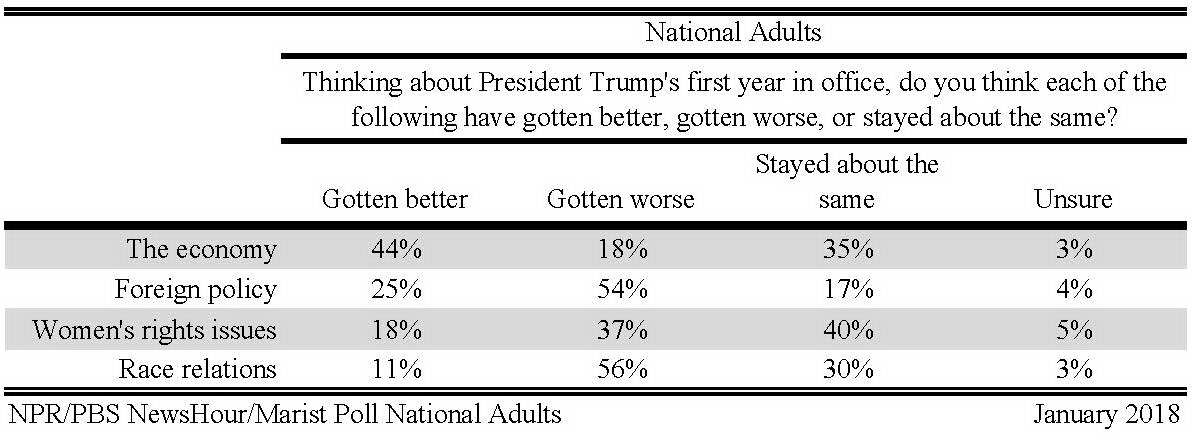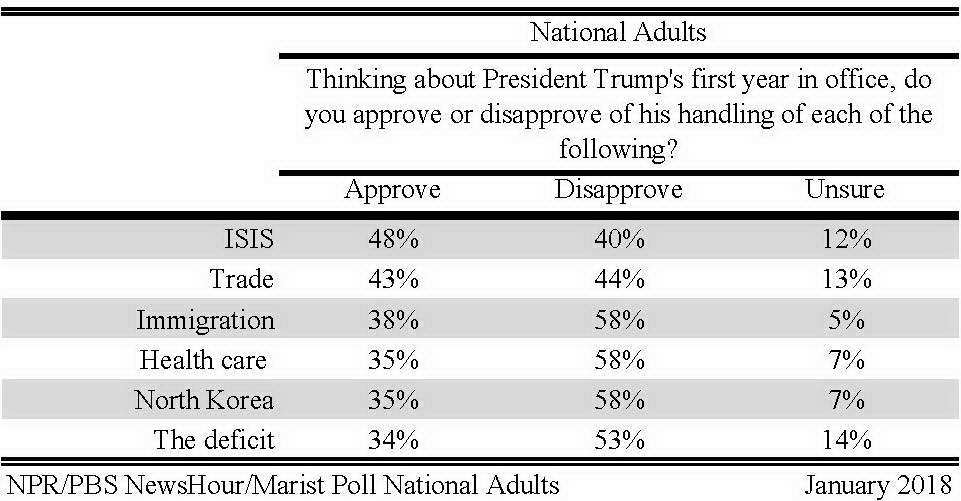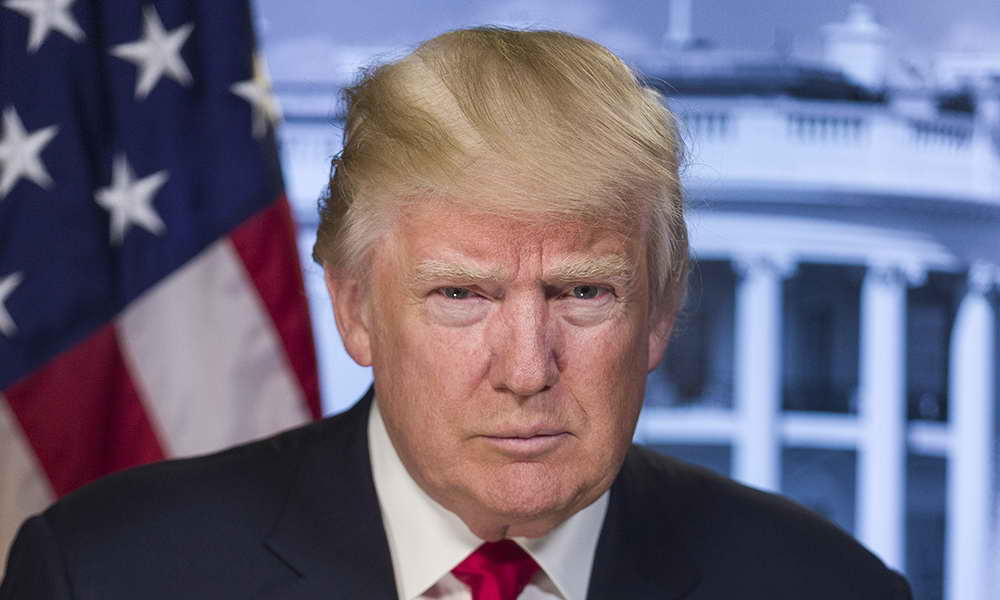January 18, 2018
President Donald Trump: One Year Later
NPR/PBS NewsHour/Marist National Poll
A majority of Americans (53%) do not think President Donald Trump’s first year in office has been successful including 33% of those who believe his time in office has been a major failure. Despite this characterization from the majority of Americans, President Trump is on solid footing with his base. Most Republicans (87%) and Americans who supported him during the 2016 presidential election (91%) consider the president’s first year to be a success. Of note, 37% of Republicans perceive the past year to be a major success for Trump. Most Democrats (87%) think 2017 was a failure for President Trump including 62% who view it as a major one. Half of independents (50%) think Trump’s first year was a failure. 40% say it was a success.
“If you don’t try to reach out beyond your base, don’t expect your standing to improve,” says Dr. Lee M. Miringoff, Director of The Marist College Institute for Public Opinion. “It’s not really surprising how Americans rate President Trump’s first year given what he has been pitching, how he’s been pitching it, and to whom.”
A plurality of Americans (46%) say Trump has not met their expectations as president. More than one in three (34%) report he has, and 15% say he has exceeded their expectations. Identical proportions of registered voters share these views. When this question was asked at the end of former President Barack Obama’s first year in office, 47% of voters said he had not met their expectations, 42% thought Obama had, and 7% said he had exceeded their expectations.
A slim majority of Republicans (51%) think President Trump’s first year has met their expectations, and 28% report he has exceeded them. Nearly one in five members of the GOP (18%) say Trump has fallen short. Among independents, a plurality, 44%, say President Trump has fallen below their expectations, 36% report he has met them, and 16% of independents think he has exceeded them. 71% of Democrats report Trump has missed the mark.
To compound matters for the president, Americans are tepid about the direction in which he is moving the country and do not feel their current situation has been improved under the Trump Administration. 42% of Americans think President Trump is changing the nation for the worse, and 36% believe he is changing it for the better. A notable 21% say he is not creating any real change at all. These results are similar to those reported in March 2017.
Trump slightly underperforms his predecessor on this question. When looking at registered voters, 39% say Trump is changing the nation for the better. In 2009, 44% of voters thought the same of President Obama. 42% of voters currently say Trump is changing the nation for the worse, higher than the 35% who had this view of Obama at a similar point in his presidency.
36% of residents nationally say they are better off since President Trump took office. 39% report they are worse off, and 22% do not feel much different than before his presidency. A partisan divide exists. 76% of Republicans feel better off while 68% of Democrats say they are worse off.
Many Americans also do not think President Trump is making strides to bring the nation together. 61% of residents report he is doing more to divide the country than to unite it (32%). Seven percent are unsure. When this question was reported last February, 57% of Americans thought Trump was doing more to divide the country than to bring it together (36%).
Digging deeper into President Trump’s first year in office, a plurality of Americans (44%) assert the economy is performing better since Trump took office. 18% of adults think the nation’s economy is doing worse under President Trump, and 35% say it is doing about the same as before.
Majorities of Americans think race relations (56%) in the United States and foreign policy (54%) have deteriorated since President Trump took office. Although 40% believe the issue of women’s rights has seen little change in the past year, 37% think women’s rights have gotten worse. 18% say things have improved in the past year.

Six in ten Americans (60%) perceive the president’s policies as mostly directed toward helping the wealthy. 25% say they favor the middle class, and only 2% believe they bolster the poor.
In which policy area has President Trump had the most impact during his first year in office? 21% of adults nationally say he has had the greatest influence on the economy, and a similar 20% report he has impacted taxes the most. Immigration (16%) and national security (12%) follow. Eight percent cite the courts, 7% mention energy and the environment, and 5% say health care. Only 2% believe Trump has had the most effect on education.
Despite the impact the president has had on these policy areas, majorities of Americans think he has missed the mark in how he has dealt with many of them. 58% of U.S. residents disapprove of President Trump’s handling of health care, 58% are dissatisfied with his approach to North Korea, 58% disapprove of how he has tackled immigration, and 53% are displeased with his handling of the deficit.
President Trump’s approach to ISIS is the only area where he receives a greater positive than negative score. 48% approve while 40% disapprove. Americans divide about how Trump has managed trade. 43% approve, 44% disapprove, and 13% are unsure.

President Trump’s overall job approval rating has been stuck in the thirties since he took office. His current approval score stands at 37% among Americans, unchanged from the 37% rating he received in December. 53% of adults nationally disapprove of how the president is doing his job, and 10% are unsure.
Most Republicans (85%) approve of the president’s job performance while most Democrats (86%) do not. These results are similar to December’s findings.
The proportion of Americans who strongly disapprove of how the president is doing his job (39%) is still larger than those who strongly approve (23%). But, the proportion who strongly approve is at its highest since the question was first asked in June 2017. When last reported in December, 45% reported they strongly disapproved of Trump’s performance in office, and 20% said they strongly approved of it.
President Trump’s favorable score remains upside down. 36% of Americans have a favorable impression of him while 58% have an unfavorable one. In December, 35% and 60%, respectively, had these views.
When it comes to social media, 78% of U.S. residents, including 57% of Republicans, think President Trump’s use of the social media platform is a risky way to communicate. Only 15% say it sends the right message. Seven percent are unsure.
Looking at the approval ratings of the congressional Republicans and Democrats, only 28% of registered voters, comparable to 25% last month, approve of how the Republicans in Congress are performing while 61% disapprove. Even 29% of Republican voters disapprove of how the members of their own party are doing their job. Congressional Democrats receive similar marks. 28% of voters nationally, down slightly from 32% previously, approve of how the Democrats in Congress are doing their job. 57% disapprove, and 14% are unsure.
With the 2018 midterm elections on the horizon, Democrats (46%) have the lead over Republicans (40%) in the generic ballot question. However, the Democrats’ advantage has decreased. When this question was last reported in December, 50% of voters said they favored the Democrat while 37% supported the Republican. The change has occurred mostly among independent voters. While independents favored the Democrat (43% to 32%) in December, they now divide (36% for the Democratic candidate in their district to 38% for the Republican candidate in their district).
“The generic congressional ballot question, unlike the approval ratings of President Trump and Congress, seems to be more fluid. One of the few times we found just a single-digit advantage for the Democrats occurred when Trump was in Asia, and his tweets were less frequent and Congress was not in a heated debate,” says Dr. Lee M. Miringoff, Director of The Marist College Institute for Public Opinion. “This survey was conducted in the glow of his bipartisan meeting with Congress at the White House this week.”
A plurality of Americans (46%) oppose the recently passed tax reform bill. 36% favor it, and 18% are unsure. Opinions fall along party lines with three in four Republicans (75%) supporting it and nearly eight in ten Democrats (79%) opposing it. Independents divide (40% favor to 44% oppose).
Opinions of the impact of the tax reform bill have shifted. Americans divide about whether the tax reform bill will mostly help their family financially (39%) or will mostly hurt their family’s financial picture (40%). Eight percent say it will make no difference. When this question was last reported in December, a majority of Americans (52%) thought the tax reform bill would result in financial hardship. Only 30%, at that time, believed they would benefit from the legislation.
Regardless of political party, impressions of the tax bill have improved. The sharpest increase has occurred among Republicans. 69% of Republicans, up from 57%, now see a financial benefit resulting from the tax reform bill. 18% of Democrats, an increase from 11%, and 40% of independents, up from 30% last month, agree.
Americans perceive tax reform to mostly benefit businesses (64%) as opposed to helping working people (22%). Democrats (86%) and independents (66%) are more likely than Republicans (31%) to say the bill mostly helps businesses. A plurality of Republicans (47%) think working people will reap the most benefit from the tax reform bill.
In the realm of foreign policy, most Americans (89%), identical to 89% last April, think North Korea is a threat to the security of the United States. This includes 50% who perceive the nation to be a major threat and 39% who say it is a minor threat. Only 8% do not consider North Korea to be a threat to the safety and security of the United States.
There is considerable concern among Americans that the United States will go to war with North Korea. More than seven in ten adults nationally (71%) are either very concerned (44%) or concerned (27%) about this possibility. 29% are either not very concerned (18%) or not concerned at all (11%).
When looking at the issue of sexual harassment in the workplace, a plurality of Americans (43%) believe the recent allegations against prominent men in entertainment, politics, and the media have changed things for the better. 14% say they have changed things for the worse, and 37% believe they have not changed anything at all. Similar proportions of men (42%) and women (44%) think these accusations have improved the situation in the workplace.
Americans remain pessimistic about the direction of the nation, but fewer people think it is moving in the wrong direction. 57% of Americans consider the country to be moving in the wrong direction, down from 64% in December. 35% think the nation is moving in the right direction, modestly up from 30% previously.
Complete January 18, 2018 NPR/PBS NewsHour/Marist Poll Release of the United States
Complete January 18, 2018 NPR/PBS NewsHour/Marist Poll of the United States (Tables of Adults and Registered Voters)
Marist Poll Methodology
Nature of the Sample

